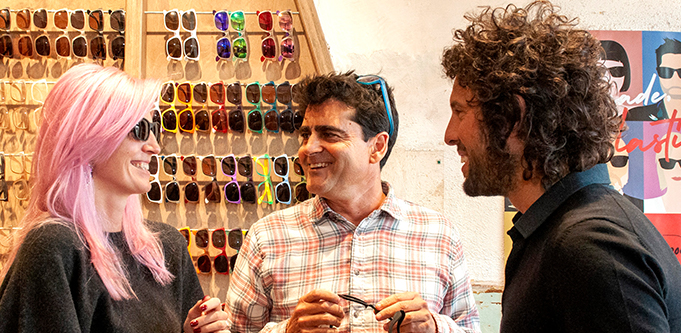
Sustainable Salon co-founders Ewelina Soroko (left) and Paul Frasca (right) with Dresden Vision's co-founder Bruce Jeffreys (centre). Source: supplied.
Two Aussie businesses are repurposing empty shampoo bottles to create sunglasses frames, in a quest to prove plastics can, and should, be reused for more than just low-grade products.
Sustainable Salons collects waste from salons across Australia and New Zealand, and Dresden Vision uses the plastic to create sunglasses, that it sells for up to $100 a pop.
Dresden Vision’s co-founder Bruce Jeffreys tells SmartCompany the properties of recycled plastics means they can be recycled into better products than people realise.
“The reality in Australia is if any plastics are recycled, they’re recycled into very, very low-grade uses,” he says, such as bins and speed bumps.
“Shampoo bottles are actually a great material that we’ve made into a higher quality product.
“We want to use the quality of the plastics to their best advantage.”
Jeffreys credits the idea to Sustainable Salons owner Paul Frasca, who collects and cleans reusable waste from salons for recycling into quality products.
“It’s not just about recycling, it’s about what we do with all the materials — that’s a really big part — as well as what it adds to the community,” Frasca tells SmartCompany.
“And then the other big part is how do we drive the businesses who sign up to our program?”
“We’re all about people, planet and profit,” he adds.
Trial and error
Making the frames wasn’t a one-day process, and Frasca says innovation comes with an initial cost.
“I know it sounds a bit crazy, but when you’re solving problems, you have to think outside the box,” he says.
“If you’re too focused on the money aspect, in the beginning, nothing ever happens.”
An example of this was during research and development where it became clear that recycled shampoo bottle plastics shrink differently to virgin plastics.
It took a lot of experimentation with different additives to allow prescription lenses to fit the plastic frames correctly before the businesses could make a usable product.
“One of our goals is to make the recycled plastic almost the same quality as the virgin plastics,” Jeffreys says.
“There’s not a lot of precedent to follow.
“It took a bit of experimentation and it always takes longer than you think to do something really well.”
Finding the right partner
Although Dresden Vision has dappled with the idea of making its frames out of other materials, such as used fishing nets, it’s Frasca’s focus on creating sustainable practices along the entire supply chain that made this idea the first “scalable and commercially viable product” for it.
“What Paul and his team gave to us was the smarts around managing the waste so it comes to us in a form that is really usable,” Jeffreys says.
“There’s a lot of practical stuff — collection, sourcing and then re-processing of the material. So you want to do it in a way that’s really efficient so we can make this a permanent thing.”
Similarly, although Sustainable Salons has a network of participating businesses that provide the recyclables, Dresden Vision was one of the only businesses to agree on the need to turn those materials into something more than speed bumps and bins.
“What’s unique with Bruce and I is that we think the same,” Frasca says.
“We just don’t know how to say ‘no’ to each other. People like us will find a way to make it happen, even if we lose money in the beginning.”
Making it an industry effort
Frasca’s know-how about sustainable recycling practices in business stems from his insistence that Sustainable Salons is primarily in the business of education, rather than recycling.
“It doesn’t work without education,” he says.
He spends a lot of time empowering salons in making change, beyond just flicking off the switch on power outlets when appliances aren’t in use.
The salons are also supported with the infrastructure needed to make the change. An eight bin system is installed to separate waste such as hair, bottles and old electronics — all of which are separated into different programs to be recycled.
“It’s not just throw it in there. It’s about how to rinse it out and do what we call a light cleaning,” Frasca says.
After being taught, the salons are expected to do this independently before it’s shipped off to Sustainable Salons, which finishes the cleaning process by removing stickers before breaking down the bottles for Dresden Vision.
“And the hairdressers are really into it — they’re really conscious of the waste,” Jeffreys adds.
READ NOW: China’s recycling “ban” throws Australia into a very messy waste crisis


COMMENTS
SmartCompany is committed to hosting lively discussions. Help us keep the conversation useful, interesting and welcoming. We aim to publish comments quickly in the interest of promoting robust conversation, but we’re a small team and we deploy filters to protect against legal risk. Occasionally your comment may be held up while it is being reviewed, but we’re working as fast as we can to keep the conversation rolling.
The SmartCompany comment section is members-only content. Please subscribe to leave a comment.
The SmartCompany comment section is members-only content. Please login to leave a comment.